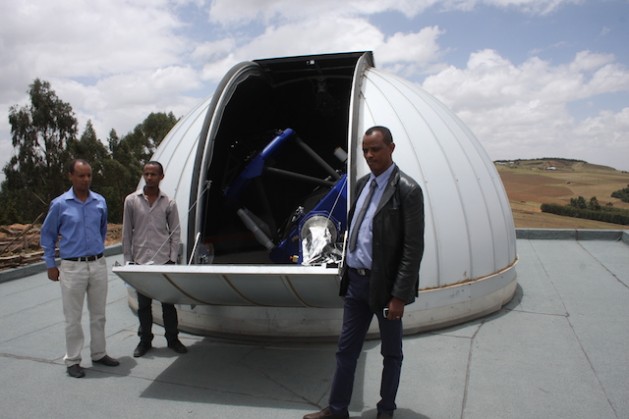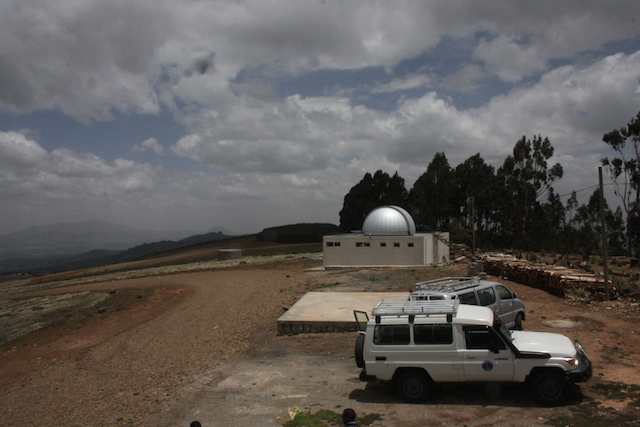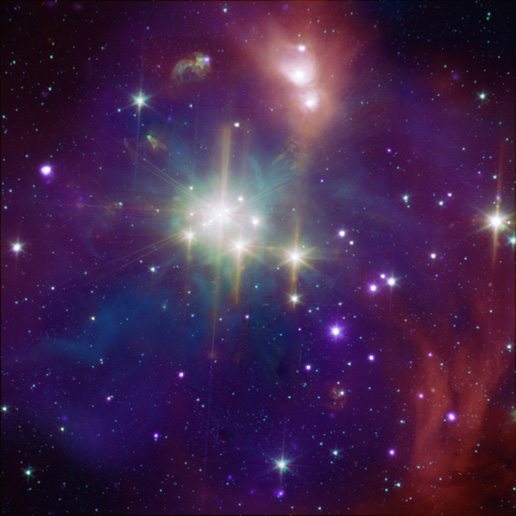Ethiopia Shoots for the Stars and Galaxies as it Aims to Become Space Science Hub

Solomon Belay, director of the Entoto Observatory and Research Centre, stands on the right-hand side of one of the observatory’s two telescopes situated in the Entoto Mountains, overlooking the Ethiopian capital, Addis Ababa. Credit: James Jeffrey/IPS
ADDIS ABABA, Jun 6 2014 (IPS) - High up in the eucalyptus-strewn Entoto Mountains, which overlook the Ethiopian capital, Addis Ababa, work is nearly complete on the country’s first observatory. Studying the stars and the galaxies will be vital for this Horn of Africa nation’s development and will hopefully also go a long way to developing brotherly love, say scientists who are part of the project.
“Space technology is often considered a luxury only for developed countries,” Solomon Belay, director of the
Entoto Observatory and Research Centre , tells IPS. “But it’s actually a basic and vital need for development.”
He points out that space science technology and research can be applied to many basic necessities of life including health, energy, food security and environmental management.
Ethiopia’s highland topography — the observatory sits at 3,200m — and the ideal climate here, which includes the thin air and minimal cloud cover for most of the year, make it ideal for housing observatories from where you can observe the stars and galaxies.
Already another observatory is planned to be built near Lalibela, home to Ethiopia’s famous rock-hewn churches. It would be even higher at about 4,200m.
It is hoped that the observatories will kick start a scientific culture in Ethiopia, an important boost to socio-economic development, those involved tell IPS, as space science has applications in myriad areas in the public and private sectors.
Josef Huber, a systems engineer with German-based
Astelco Systems that built and installed the Entoto Observatory’s telescopes, who volunteers at a public observatory in Munich, Germany, points out that studying the stars is more than just about development.
“When people see Saturn for the first time, and it’s not just a picture, they’re really impressed,” he tells IPS.
“For many people their world is their home and neighbours — when you see beyond that, you will never fight with your neighbour, especially if you realise a star could explode and wipe out a galaxy.”

One of two telescopes at the Entoto Observatory and Research Centre situated in the Entoto Mountains, overlooking the Ethiopian capital, Addis Ababa. Credit: James Jeffrey/IPS
The observatories will also provide training and research facilities for students at 33 Ethiopian universities, and will serve to attract international academia and scientists. It is hoped that Ethiopia will one day become the African version of Chile, a global hub for astronomy and research.
There are those who don’t share the enthusiasm, however. Recent media criticism has focused on donor countries continuing to provide millions of dollars of aid to African countries — Ethiopia remains a major recipient of foreign aid — that are embarking on aerospace adventures while many inhabitants continue to suffer in urban slums and rural villages.
“Ethiopian politicians have recognised the role space science can play in helping Ethiopia’s development, and are supporting generating investment in the country’s new observatories and space programme.” -- Abinet Ezra, the Ethiopian Space Science Society
It’s estimated that nearly 70 percent of the population in sub-Saharan Africa still live on less than two dollars a day. In Ethiopia it’s estimated that 29 percent of the population live below the poverty line.
Nevertheless, Ethiopia now has its four-million-dollar Entoto Observatory, housing two one-metre class telescopes, each of which weighs six tonnes and cost about 1.5 million dollars. It is the result of work by the
Ethiopian Space Science Society (ESSS) , which was founded 10 years ago to address the lack of space science activity and interest in Ethiopia.
At ESSS’s inception, “most Ethiopian politicians were not ready for space science,” Abinet Ezra, communications director for ESSS, tells IPS.
In its early days ESSS had to import telescopes from the U.S., but that proved difficult due to foreign exchange rates, Abinet says.
“Science development is not easy in Africa,” Solomon adds. “Science needs political visibility otherwise it is not deemed important enough or allocated a budget.” He adds that economic strategies often weren’t linked to science and technology, with attention given instead to small-scale agriculture.
So far only a handful of African countries — such as South Africa, Nigeria, Egypt and Morocco — have space programmes that have launched satellites. But they’re likely to have company soon. In addition to Ethiopia’s efforts, Ghana and Uganda recently established space research programmes and are thought to be several years from putting satellites into space.
“Ethiopian politicians have recognised the role space science can play in helping Ethiopia’s development, and are supporting generating investment in the country’s new observatories and space programme,” Abinet says.

The coronet cluster is star-making hotspot. Credit: NASA, Chandra/CC By 2.0
Currently very little astronomy is taught in sub-Saharan Africa outside South Africa, which the Entoto Observatory seeks to address by facilitating Masters and Ph.D. training in observational and theoretical astronomy, space science, and earth observation.
There could be also be financial rewards from a planned visitor centre and the observatory selling information garnered, such as real-time weather forecasting and trend data.
But it’s the intangible benefits that those involved seem most passionate about.
“Astronomy gets the young to embrace science and technology,” Solomon says. “And a space programme is an important tool to inspire students to enjoy physics and chemistry.”
“When I was a child I became interested in space science but couldn’t find anywhere to study it,” says 24-year-old Eyoas Ergetu, a mechanical engineer graduate student at Addis Ababa University, and part of the observatory’s team. “So it’s very exciting to be working here.”
ESSS wants Ethiopia to catch up with African countries that have launched satellites, and is lobbying the government to focus on getting Ethiopian satellites in space within the next decade.
These could help improve telecommunications, and the monitoring of activities such as mining and farming, and construction of major infrastructure like the
Renaissance Millennium Dam Project. The dam project has been beset by controversy regarding its potential environmental impact since it was announced in 2011.
Already Ethiopia is using foreign-owned satellites for such purposes — while having to pay to do so.
Eyoas says he will start a graduate degree in aerospace engineering: “If Ethiopia is to launch satellites it will need experts to design them — I want to be one of those people.”
The signs are encouraging: next year a small satellite designed and constructed at
Addis Ababa Institute of Technology (AAiT) will become the first Ethiopian satellite in space, sent into space with another 49 satellites from various international organisations in a single rocket launch, as part of the European-based QB50 project.
This initiative aims to achieve sustained and affordable access to space for small-scale research space missions and planetary exploration. AAiT was the first African institute selected to participate.
And this year the
International Astronomical Union (IAU) signed an important agreement with Ethiopian partners to host an East African regional node of the IAU Office of Astronomy for Development. This is the first regional node to be established on the African continent as part of the IAU’s strategy to realise global societal benefits of astronomy.
“Development is not always sustainable,” Solomon says. “But if it comes through science and technology it is sustainable.”

 Print
Print

